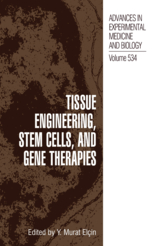Molecular biomarkers used to detect cellular damage in tissue engineered medical products.
BIOMED 2002 International, Antalya, Turkey, 2002.
Publication year: 2002
To assure that tissue engineered medical products are free of genetic changes that might occur from inflammation during the development phase of the product, Tissue engineered skin (TestSkin II) was obtained, separated into its two cellular layers (epidermis and dermis) and DNA was extracted. The first biomarker tested consisted of screening for DNA point mutations in the p53 gene, the most commonly mutated gene in skin cancer. It was shown that tissue-engineered skin did not contain mutations in this gene at the level of sensitivity of SSCP-capillary electrophoresis and Denaturing High Performance Liquid Chromatography. Results were compared to control cells (neonatal fibroblasts and neonatal keratinocytes) and fibroblasts that were obtained from a 55-year-old and 96-year-old human donor. The second set of biomarkers tested looked at the loss of the Y-chromosome. Using Fluorescent In Situ Hybridization technology, no detectable loss of Y-chromosome was found in the tissue-engineered skin, neonatal and 55- year-old donor control cells. Y-chromosome loss was found in the fibroblasts from the 96-year-old donor.

